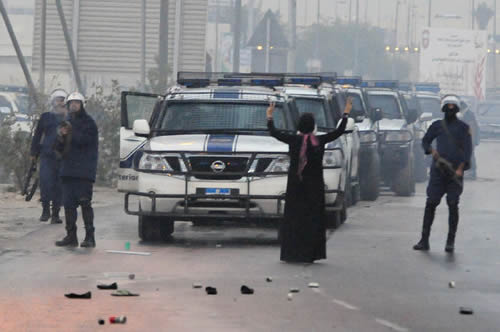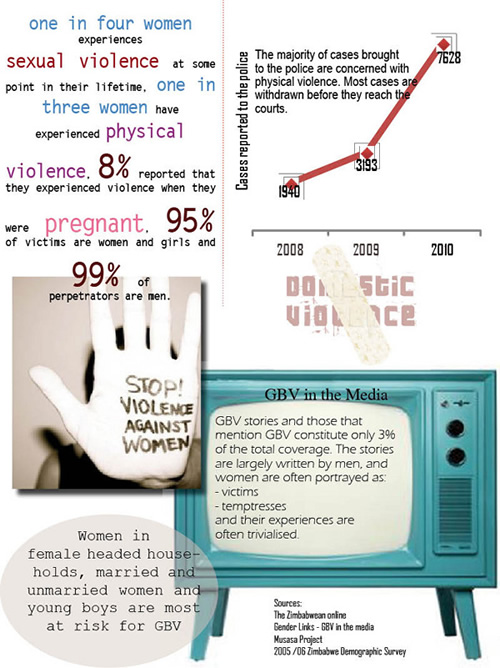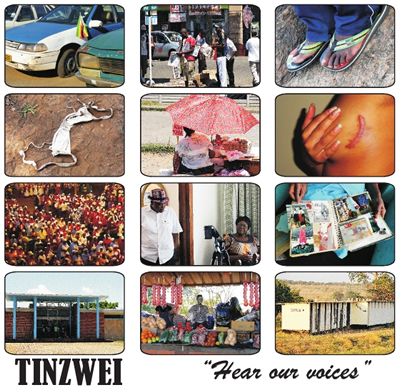The many women who are violated in our country have duties in society. They have things they have to do and ways in which they contribute to the Zimbabwe being what is on a daily basis. Whether she is a teacher, street vendor, nurse, secretary or indeed a housewife, she is making a consistent contribution to society, regardless of whether she is paid or not.
When workers get injured either at work, or while off duty, he/she is either compensated and/or given time off to recuperate. Either way, the individual’s productivity is affected by these injuries. Why then do we not see that injuries sustained by a woman who is affected by gender based violence (GBV) affect both her physical well being as well as her ability to perform her designated duties, therefore impacting negatively on the economy?
Who does the work … while she nurses her wounds, while the police give her the run-around, while she pursues her case against a perpetrator in the courts, or when the monster has finally killed her? Who will do the work while women continue to be violated?
Society’s apathy towards the apparent increase of GBV frightens me. Maybe if we look at this issue from a purely selfish point of view, that of wanting to ensure that the economy flourishes and that business continues as usual, we might finally grasp the seriousness of the impact of GBV. Read the following article from the Herald for a more in-depth look at how GBV impacts Zimbabwe economically:
They are the mothers, teachers, cleaners, caregivers, cooks, nurses, entrepreneurs, vendors and cross-border traders. The list of women’s contribution to society and the country’s economy is endless yet in most cases unrecognised or even ignored. Worse still, their loved ones barter them.
While gender-based violence is perpetrated by both men and women, UNFPA reports that 95 percent of victims are women while 99 percent perpetrators are male. Indeed, Zimbabwe’s financial economy is dependent on women’s reproductive and care-giving work for the fitness, well-being and the very existence of the paid workforce. The economy also relies a great deal on women to pick up the pieces ignored by the paid economy. These include nursing elderly people, tutoring and childcare. The value of unpaid work is as much a part of the monetary economy as paid work. Yet precisely because it is unpaid, the work has long been overlooked and undermined in the economic equations. Sometimes women themselves ignore the fact that unpaid work is actually work.
Some of the women who are not formally employed and stay at home will say they are not employed and overlook the cleaning jobs at home. These are unpaid duties expected of them by society, nothing more.
This is due to the many years of socialisation women underwent from childhood when they would be given dolls and pots to play with while boys where given cars, toy guns and bicycles to ride.
Interestingly, when the same woman gets an office job and they hire a domestic worker, they are expected to pay the domestic worker.
Some women have dedicated their time and energy towards volunteer care work yet it is also another vital unpaid contribution women make to their communities as well as to the economy.
Volunteer work is varied and extensive and takes a lot of energy out of women who also have to go to their homes and take care of their families.
But despite all these contributions to the country’s economy, most women are subjected to all forms of gender-based violence. The Multiple Indicator Monitoring Survey of 2009 indicated that in Mashonaland Central Province some women are beaten up for simple things like burning a pot of sadza, failing to look after children, refusing to have sex, going out without telling their husbands and arguing with husbands.
Many women have lost their lives leaving behind children some as young as two months old. Some cases have gone unreported with the victims suffering in silence. Placard-holding women have marched on the streets denouncing this monster that has “feasted” on the flesh of many women.
Some members of our society have simply watched the increasing cases of GBV with apathy.
Unscrupulous people would rather report the matter in their neighbourhood to “H-Metro” as part of their entertainment, while some law enforcement agents are reportedly dismissing GBV reports by women as trivia.
Most dangerously, some people have accepted GBV, especially between married couples as a “normal” phenomenon.
This year’s commemoration of the16 Days of Activism Against Gender Violence stretching from November 25 to December 10 should be a time of introspection for perpetrators of GBV, families, society, government and everyone who cares.
Perpetrators of GBV should carefully study their balance sheets and income flows and establish the economic impacts of their heinous deeds.
They should publish full statements showing how much they fork out to pay for the medical bills incurred by their maimed wives, litigation, transport on trips to hospital, airtime to seek counselling from relatives and friends.
And there is absence from the woman’s care work while she nurses wounds if not funeral costs.
The Government and the police should consider the amount of taxpayers’ money that is lost through the court processes, calculate how much money is spent to convene a full court session, paperwork, and prosecutor and judge to preside over GBV matters. What about the pressure of work added to the already overwhelmed hospital staff and equipment?
The police should realise GBV is a burden to the national fiscus and that has a direct impact on their salaries too.
Police attended to 1 940 cases in 2008, increasing to 3 193 in 2009, then skyrocketing to 7 628 in 2010. Between January and March this year, 2 536 cases have already been reported to police, a high number compared to that of last year during the same period.
The majority of the reported cases are those of physical violence but sadly most of the cases are withdrawn before going to court or in court. Any right thinking police force should be concerned about these records. So should everyone else.
Its is apparent that 16 Days of Activism Against Gender Violence is not long enough to address GBV. However, the annual campaign serves to mobilise support for zero tolerance to GBV for the many generations to come.
The 16 Days of Activism Against Gender Violence is an international campaign originating from the first Women’s Global Leadership Institute sponsored by the Centre for Women’s Global Leadership in 1991.
Participants chose the dates, November 25, International Day Against Violence Against Women and December 10, International Human Rights Day, in order to symbolically link violence against women and human rights and to emphasise that such violence is a violation of human rights.
This 16-day period also highlights other significant dates including November 29, International Women Human Rights Defenders Day, December 1, World Aids Day, and December 6, which marks the anniversary of the Montreal Massacre.
The 16 Days Campaign has been used as an organising strategy by individuals and groups around the world to call for the elimination of all forms of violence against women.
If zero tolerance against GBV means zero tolerance against economic distress, then Zimbabwe should use its budget, its police force, its politics and all means necessary to stop violence against women.
Source












